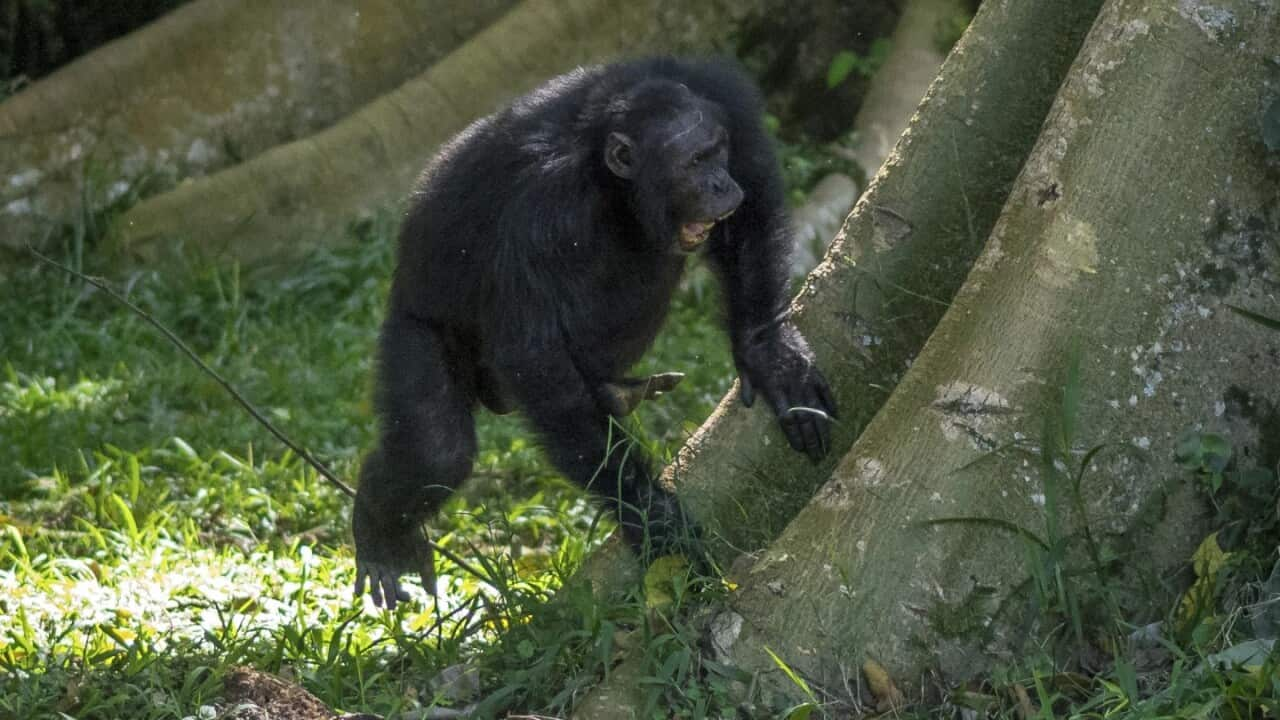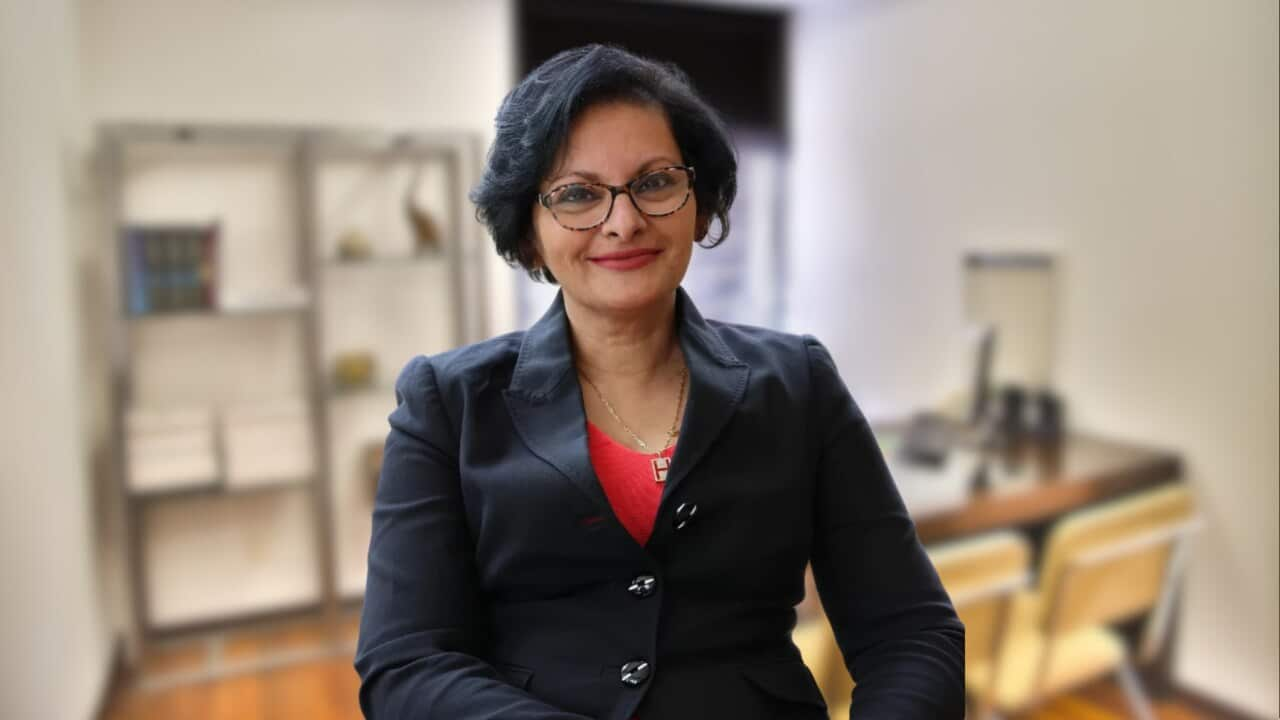Listen to Australian and world news, and follow trending topics with SBS News Podcasts.
TRANSCRIPT
In a tent camp in Khan Younis, Fatma Khalafallah says the extent of 18 months of fighting in Gaza is starkly apparent - and can be seen in the ruins around her.
For over a month, there have been no commercial or humanitarian supplies allowed into Gaza, after a fragile ceasefire fell apart.
"There is no home, no mosque, no school, no hospital, and no clinic left. Gaza became a desert that is not suitable for living. What do they want more? Nothing is left. They took the houses, safety, health, and peace. Our children do not even find food to eat. We are not able to drink clean water."
Speaking hours before Israeli Prime Minister Benjamin Netanyahu met with US President Donald Trump at the White House, Ms Khalafallah says she has just one wish.
" As Palestinians, we just ask for peace. We hope the meeting between US President Donald Trump and Israeli Prime Minister Benjamin Netanyahu will result in peace. We are asking for safety and peace. We hope, God willing, this meeting will result in peace and the war ends, and people return to their homes and live safely."
Mr Netanyahu's visit follows the collapse of Israel's six-week truce with Hamas, which saw the return of 33 Israeli hostages, in exchange for the release of some 1,800 Palestinians held in Israeli jails.
The prime minister insists increased military pressure is the only way to force Hamas to return the remaining hostages, dead or alive.
He says his discussion with Mr Trump included progressing with a new deal to return the remaining hostages.
"The hostages are in agony, and we want to get them all out. Steve Witkoff, who is President Trump's very able representative, helped us get a deal that got 25 out. We're working now on another deal that we hope will succeed. And we're committed to getting all the hostages out but also eliminating the evil tyranny of Hamas in Gaza."
For his part, Mr Trump spoke again of his idea to have the US take over Gaza and displace the two million Palestinians living there.
The proposal first announced in early February has been roundly condemned by countries around the world, including by Egypt and Jordan, where Mr Trump has suggested Gazans be sent to live.
Mr Trump says he thinks the idea still has merit.
"I think it's an incredible piece of important real estate. And I think that it's something that we would be involved in... And if you take the people, the Palestinians, and move them around to different countries, and you have plenty of countries that will do that, and you really have a freedom zone. You call it the freedom zone. A free zone, a zone where people aren't going to be killed every day."
Meanwhile, leaders of the UN humanitarian agencies have issued a dire joint warning about Gaza, calling on world leaders to ensure the basic principles of international humanitarian law are upheld.
The UN says more than 2.1 million people are trapped in Gaza without food, medicine or fuel.
And more than 1,000 children have reportedly been killed or injured in just the first week after the breakdown of the ceasefire, the highest one-week death toll among children in Gaza in the past year.
UN spokesman Stéphane Dujarric says no-one is safe, with at least 408 humanitarian workers among those killed since October 2023.
"Israeli attacks continue unabated, causing systematic large-scale civilian casualties. People, including many children, are being killed, injured and maimed for life. Survivors across Gaza are being displaced repeatedly and forced into an ever-shrinking space where their basic needs just cannot be met. Overall, we estimate that nearly 400,000 people have been displaced yet again since the breakdown of the ceasefire – that's 18 per cent of all Palestinians in Gaza."
The fallout continues after the killing of 15 Palestinian medics by Israeli forces last month.
The head of the Palestinian Red Cross Society has called for an independent and thorough investigation.
The Israeli military has admitted it made an error in its initial account of what happened, after mobile phone footage of one of the killed workers was retrieved and released showing that the vehicles fired upon were clearly marked ambulances and fire trucks with their lights.
This contradicted the earlier claim by the Israeli military that the vehicles were unmarked and approached in the dark without their lights on.
The Israeli military now says the results of an initial investigation has found soldiers opened fire due to a sense of threat, after they identified six Hamas militants in the vicinity.
The head of the Palestinian Red Cross Society, Dr Younis Al-Khatib, says firing on health workers is unacceptable.
"So many questions we are asking the Israelis. Why they were killed? They were wearing their gears. The lights were on, why they were killed? Why did you destroy the ambulances after killing them? Why did you hide the bodies? Why and why? They have to answer for that. This is why an investigation, an independent investigation, has been our number one request from the international community."
The death toll of Palestinian journalists has also increased, with the death of Helmy al-Faqawi from an Israeli air strike that hit a tent used by local media in southern Gaza.
Colleague Abd Shaat says he survived the incident, but it is a reminder of the dangers journalists in Gaza face.
"At around 3am at dawn, we woke up to the sound of an explosion. We all got out of our tents and saw the airstrike had hit the tent of our colleague. We will continue to convey the truth to the whole world. This is our humanitarian duty."
The Palestinian Journalist Syndicate says more than 200 journalists have been killed by Israeli fire in Gaza since early October 2023.
Israel regularly denies targeting journalists and says it takes steps to avoid hitting civilians.
Meanwhile, a whistleblower group of former Israeli soldiers says Israeli forces have extended its control across the Gaza Strip since relaunching its military operation against Hamas last month.
The group called Breaking the Silence has released a report concluding that Israel now controls more than 50 per cent of the territory.
Advocacy director Joel Carmel says a military buffer zone around the Gaza border has doubled in size in recent weeks.
"Before the 7th of October there was something of a buffer zone already. That was about 300 metres into the Gaza Strip. Although over time that was kind of eroded and there were various exceptions and people were allowed in. And so I think it would be a mistake to look at this as just an extension of an existing buffer zone, because basically what we've done here is created an entirely new area, which includes a huge amount of destruction in order to create the area. But also the rules of engagement are different. You know, one of our testifiers described it as being like Hiroshima, complete, complete destruction."
Prime Minister Benjamin Netanyahu said last week that even after Hamas is defeated, Israel will keep security control in Gaza and push Palestinians to leave.













